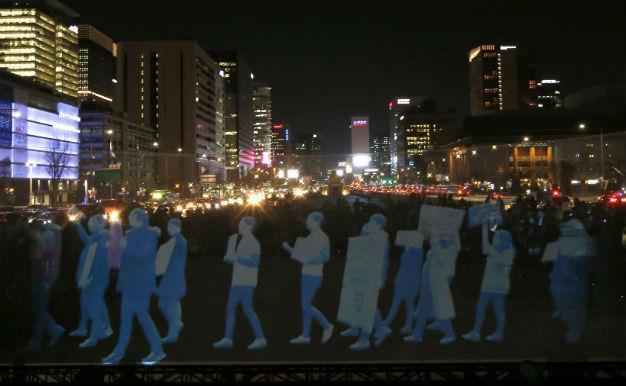'Ghost protest' in Seoul against curbs on public meetings
SEOUL - Agence France-Presse

AP photo
Dozens of "ghost protesters" appeared in the South Korean capital on Feb. 24 in a demonstration against curbs on public meetings, despite police threats of a crackdown on the virtual rally consisting of holograms of people.The virtual march -- the second in the world after a similar event in Spain last April -- was protesting against what organisers described as the erosion of freedom of assembly and of expression.
"Authorities are banning more and more public protests, especially in central Seoul, citing reasons like traffic jams or public inconvenience," said Kim Hee-Jin, director of rally organisers Amnesty Korea.
"We wanted to show that the situation has become so restrictive that only ghosts like these may freely march on the street," she said.
Blue hologram images of the protesters -- shown on a giant transparent screen set up in central Seoul -- were depicted waving banners and chanting slogans such as "Public rally is our right" and "Don't stifle voices of the people".
Dozens of people turned out to watch.
Police did not try to block the event even though Seoul's police chief earlier vowed a "stern response" to the rally -- saying the organisers had incorrectly described it as a cultural event.
Kim voiced "strong regret" at the police warning which she described as another sign of waning freedom of assembly.
Critics say the conservative government of President Park Geun-Hye, daughter of the late autocratic ruler Park Chung-Hee, is slipping into authoritarian rule.
Police have come under fire for what critics describe as excessive use of force, with one South Korean left in a coma after being hit by a jet from a water cannon during an anti-government protest last November.
An UN envoy last month accused Seoul officials of using potential traffic jams and public inconvenience as an "excuse for unduly limiting rights" to publicly demonstrate.
UN Special Rapporteur Maina Kiai also voiced concern at a "gradual regression" on rights, noting violent police tactics against protesters including water cannon.
Police sprayed more than 280 tonnes of water at public rallies in 2015, up from 48.5 tonnes the previous year, according to Amnesty Korea.
















